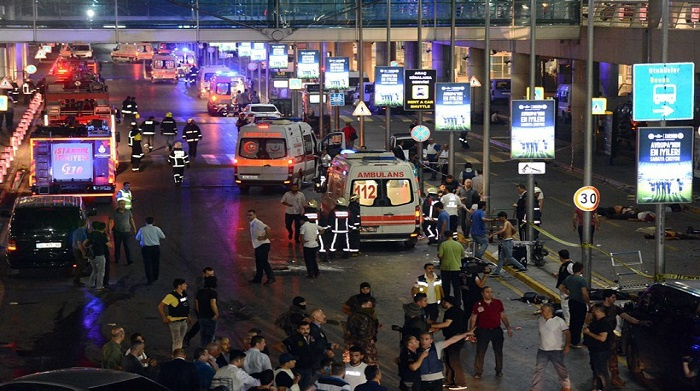Why Terrorists Are Targeting Turkey

Turkey is going through difficult days. The Tuesday evening incident in Istanbul’s Atatürk Airport, in which at least 41 were killed and 150 were injured, was the most tragic terrorist attack in the past year in Turkey – one closely resembling terrorist operations undertaken by ISIS and the likes of it. There has been no official announcement on who or what group were behind the attack. The Turkish police said footprints of ISIS and the Kurdistan Freedom Falcons were seen on the scene. Prime Minister Binali Yildirim, however, has said he is suspicious of ISIS more than any other group. Needless to say, Kurds are always potentially inculpated for any sort of incident in Turkey. We have seen the likes of the incident in Iraq and Syria. The terrorists first start shooting and then explode themselves or other individuals working in coordination. It is said that, minutes before the incident, an airplane from Tunisia had landed on the Istanbul airport when the terrorist(s) got off to carry out their plot but no evidence has been offered. While Turkey, particularly President Recep Tayyip Erdoğan and his security arm, is accused of collaboration with ISIS, the question that comes to mind is what has made ISIS decide to go to war with Turkey?
A glance at the situation and reports published on policy shifts in Turkey, the region, and countries exerting influence on the country indicate that the Erdoğan government is changing its policies, not so much in line with ISIS interests. Thus, it is obvious that ISIS will show very tough reactions in order to prevent the shift.
Erdoğan’s implied apology to Russia in a letter to his Russian counterpart Vladimir Putin and the normalization of ties with Israel announced at the same time as the Putin letter indicate the former’s shift in foreign policy. Putting these together with the Israeli PM Benjamin Netanyahu’s visit to Russia and meeting with Putin and the agreements made between the two sides, we will find out the developments are moving forward in a way that could end up unfavorably for terrorist groups such as ISIS and the Al-Nusra Front or their sponsors. Lebanese dailies Assafir and al-Akhbar reported that Netanyahu and Putin had agreed in Moscow to work together in the fight against ISIS, the Al-Nusra Front and their merger groups – even for Israel to stop aiding them and join the fight against them providing that Hezbollah and forces loyal to Iran did not reach the Golan Heights. It is said that Netanyahu has personally offered involvement in the armed fight against terrorist groups in Syria to Putin. In the visit, Netanyahu has informed the Russian President of his efforts to normalize ties with Turkey. According to Addiyar, he has said there is no way but to tolerate Erdoğan, even though he is following inappropriate stances on regional developments.
On the other hand, let us keep in mind the fact that Erdoğan never achieved his regional goals during the years he had delegated authority in foreign policy to Ahmet Davutoğlu. While he had pledged to eliminate differences with neighbors, it is now engaged in the most fierce of differences it ever had with all its neighbors, so much so that its differences with Iran are nothing noteworthy compared with other neighbors. As London-based Daily Telegraph has noted, after the differences emerged between old friends former Prime Minister Ahmet Davutoğlu and Recep Tayyip Erdoğan, the latter thinks of it as an opportunity to scapegoat his former right-hand man, as he resigns, for the existing problems, so to begin a new era in foreign relations he thought would see less tension. That is why Binali Yildirim openly declared the fight against terrorism, including the fight with ISIS, as a top political priority for him as soon as he was chosen as the Prime Minister. Nonetheless, Turkish officials know too well that it is not so simple to enter such a phase and it will bring about its own costs. Incidents like Tuesday’s Ataturk airport attack might be the least of them.

